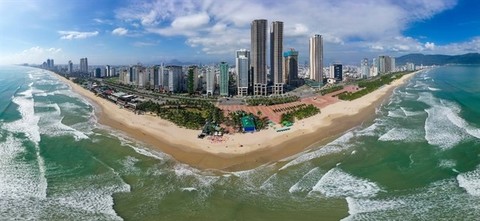
A section of the coast in Đà Nẵng City. — VNA/VNS Photo Trần Lê Lâm
The hospitality industry is recovering fairly slowly, with revenue per available room (RevPAR) still lower than 2019 levels, according to experts.
Last year, the industry seemingly recovered in most countries, with 85 per cent of global markets reporting higher RevPar than 2019.
At the conference “Meet The Experts” on Tuesday which brought together more than 700 real estate and hospitality professionals, Mauro Gasparotti, director of Savills Hotels, said: “Cities like HCM City and Hà Nội are recovering faster than beach destinations, with their average daily rate close to 2019 levels.
“HCM City has shown faster occupancy recovery than others, while beach destinations are slowly regaining momentum.
“Đà Nẵng has recovered well thanks to a strong rebound in South Korean tourists. The city receives some 25 flights a day from major South Korean cities. This accounts for over 50 per cent of the total international flights arriving in Đà Nẵng.
“In contrast, Nha Trang and Cam Ranh continue to struggle to fill rooms due to their reliance on Chinese travellers.”
Before the pandemic, in 2019, 32 million Chinese travelled to Southeast Asia.
“In Southeast Asia, Singapore and Thailand are accelerating tourism by enhancing travel convenience for foreign visitors.
“Thailand forecasts that 2025 will be one of the best years in its tourism history. They are constantly upgrading infrastructure and immigration control systems to improve the overall experience for international travellers.
“Additionally, destination marketing is strong and they use events such as international concerts as anchors for tourism. Taylor Swift’s Eras Tour in Singapore and Bruno Mars concerts are good examples.
“Although Việt Nam has undeniable potential to be one of the global destinations, important improvements are needed. Hopefully, the country can work on these to boost recovery.
“This year is anticipated to be the year of tourism in Southeast Asia, with a strengthening return of Chinese tourists. In addition to this, the Indian market is expected to become a main driving force for tourism in the next few years, and ViệtNam will have a strong chance to capture that market as well.”
Hospitality professionals agreed that international demand brings in higher revenues per visitor but the local market provides a steady stream of visitors, often more resilient to global economic fluctuations, though not generating the same revenue per tourist.
They emphasised the need for flexibility in marketing strategies, adjusting to the changing landscape of travel patterns post-pandemic.
In recent years hotel brands have expanded in Việt Nam, rising from less than 50 branded hotels in 2013 to nearly 200 today. — VNS